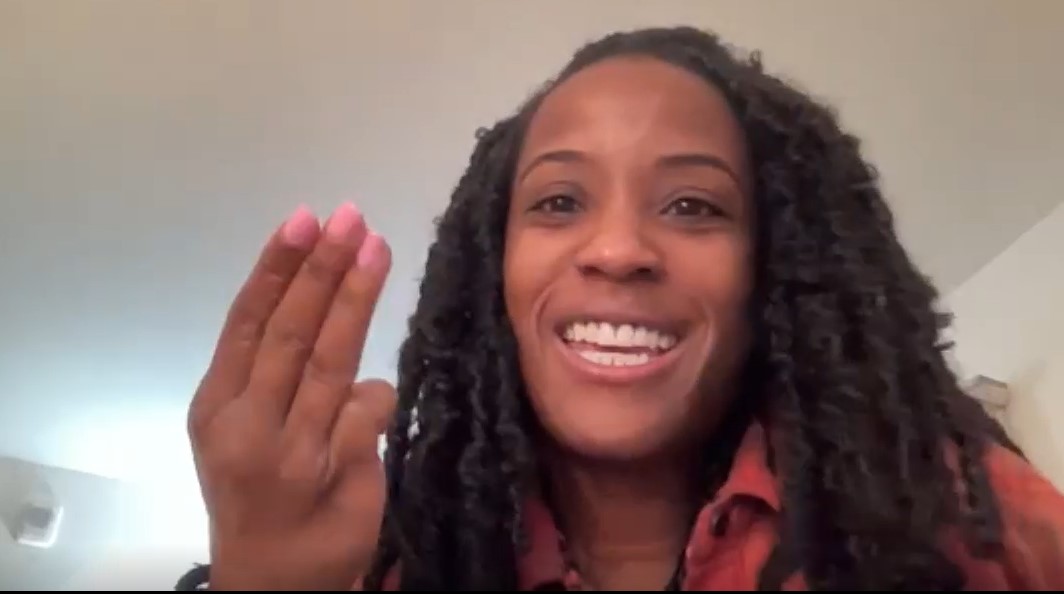News anchor talks about storytelling – and tells workplace stories
By: DEJANE LAWRENCE, ROGER OATES, TYUANNA WILLIAMS
Mar 04, 2023

Megan Rivers speaks via Zoom on Feb. 16.
Claflin University alumna Megan Rivers shared the importance of storytelling in a conference with student journalists on Feb. 16.
Rivers works as a live desk anchor/reporter in Baltimore, Maryland.
She recounted one of her proudest moments coming while she was stationed as a reporter in Washington, D.C. By reporting a story, Rivers was able to help raise money for the return home of a young overseas basketball player who was brutally attacked.
The player, out of Prince Georges County, Maryland, was attacked by multiple men at a club and fell into a coma.
“I asked her to get the mutual friend we had to start a GoFundMe page,” Rivers said of speaking to the player’s mother. “I’ll do everything I can to make the story go viral.”
The story actually did indeed go viral, and in the first 24 hours, $48,000 was raised, with one person even donating $20,000. In the end, over $100,000 was raised, which was enough to get the player home.
The player is now fully recovered, and has returned overseas to continue his basketball career.
“Through the power of storytelling, we were able to directly impact someone’s life,” Rivers said. “That’s what matters to me the most.”
In her new position at station WBAL-TV 11 News, she is able to share positive news stories.
“I’m really happy, I really like my new job,” Rivers said.
“I’m in a position now that I can tell happier stories, so I go find those stories now,” Rivers said. “I have the opportunity to tell people the news that they want to hear.”
She said that being able to tell positive stories and special assignment stories is a luxury.
“I had to work my way up to get here,” Rivers said.
Rivers recalls the origin of her storytelling/journalism passion – high school.
While in high school, she was on the yearbook staff, did morning announcements and won a national speech contest.
You’re controlling what people watch, hear and consume, Rivers said.
“I realized how powerful that was,” Rivers said. “I realized what I was doing was not about me.”
Journalism is about the lives impacted and the stories told, Rivers said. “I care about advancing people, especially our people.”
Rivers said the media world has changed and is continuing to change. One of the changes can be in the use of pronouns.
When she first started in the industry, asking someone their pronouns was not something a reporter did. You would ask them things like the correct spelling and pronunciation of their name but never what pronouns they would like to go by, Rivers said.
“This was a big learning experience for me. … You didn’t have to ask someone what their pronouns were, you went by their appearance.”
While covering a story, Rivers misgendered the individual she was interviewing. She received backlash on Twitter. She reached out to the individual and apologized for misgendering them.
Moving forward, whenever she conducts interviews, she asks about pronouns.
“If you want to be a journalist going forward, I suggest you add this to your repertoire because we weren’t taught this.”
Rivers also discussed the policing of Black hair within the workplace. For centuries, Black women have been held to the American beauty standard: blonde hair, blue eyes, thin etc.
This standard is unattainable because the size, skin tone and eye color of Black women range. Their hair also ranges in texture and reacts to weather conditions differently than a white person’s.
“It’s hard to maintain your hair when you’re a field reporter and it’s humid, it’s hot, it’s raining.”
Rivers remembers as an anchor in Charleston she had to tell her coworker to stop commenting on the different hairstyles she wore to work.
Once she addressed her coworker, she never heard anything about her hair again. Now in her new role, she’s in a work environment that cares more about the quality of her work and character than her hair.
She referred to a conversation she had with her news director about wearing her hair in braids for an interview she was conducting.
He told her, “Megan, it’s fine, wear your hair how you want to … I’ve never seen a Black person come to work and their hair not look good.”
“We’re in a society that’s more accepting of Black women wearing their hair how they choose, Rivers said. “They [employers] can’t dictate how they look.”